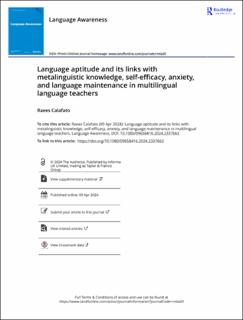Language aptitude and its links with metalinguistic knowledge, self-efficacy, anxiety, and language maintenance in multilingual language teachers
Peer reviewed, Journal article
Published version
Permanent lenke
https://hdl.handle.net/11250/3125727Utgivelsesdato
2024Metadata
Vis full innførselSamlinger
Originalversjon
Calafato, R. Language aptitude and its links with metalinguistic knowledge, self-efficacy, anxiety, and language maintenance in multilingual language teachers. Language Awareness, 1-19. https://doi.org/10.1080/09658416.2024.2337663Sammendrag
Language teachers cannot help their students develop high levels of metalinguistic knowledge and language aptitude if they themselves are found lacking in these abilities. This article reports on a study that utilised a descriptive correlational mixed-methods research design to gather data from 89 multilingual teachers of English, Chinese, French, German, and Spanish from secondary schools regarding the relationship between their language aptitude, metalinguistic knowledge, language maintenance habits, self-efficacy, and anxiety. The findings revealed that participants’ metalinguistic knowledge, anxiety, and formally acquired multilingualism positively correlated with their language aptitude. Moreover, those possessing advanced language aptitude engaged in language maintenance habits that were both quantitatively and qualitatively different from those who exhibited weaker aptitude.

